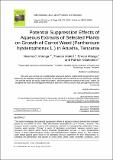| dc.contributor.author | Mtenga, Neema | |
| dc.contributor.author | Mokiti, Thadeo | |
| dc.contributor.author | Mbega, Ernest | |
| dc.contributor.author | Ndakidemi, Patrick | |
| dc.date.accessioned | 2023-10-11T12:49:20Z | |
| dc.date.available | 2023-10-11T12:49:20Z | |
| dc.date.issued | 2023 | |
| dc.identifier.uri | https://doi.org/10.9734/IJPSS/2023/v35i183273 | |
| dc.identifier.uri | https://dspace.nm-aist.ac.tz/handle/20.500.12479/2285 | |
| dc.description | This research articles was published in Journals International Journal of Plant & Soil Science Volume 35, Issue 18, 2023 | en_US |
| dc.description.abstract | This study investigates the potential suppression effects of aqueous extracts derived from selected
plants on the growth of carrot weed (Parthenium hysterophorus L.) in Arusha, Tanzania. The
research aimed to explore natural and sustainable methods for managing the proliferation of this
invasive weed species. Through a series of laboratory experiments, aqueous extracts were
prepared from specific plants namely amaranth (Amaranthus spinous L.), neem (Azadiratchta
indica L.) wheat millet (Sorghum bicolor), and marigold flower (Tagetes erictus L.). The extracts
were tested against carrot weed in the laboratory and pot experiment for their effectiveness in
inhibiting the germination and growth of carrot weed seeds under controlled conditions. Lea | en_US |
| dc.language.iso | en | en_US |
| dc.subject | Parthenium | en_US |
| dc.subject | allelopathic | en_US |
| dc.subject | inhibition effects | en_US |
| dc.subject | allelochemicals | en_US |
| dc.subject | suppression | en_US |
| dc.title | Potential Suppression Effects of Aqueous Extracts of Selected Plants on Growth of Carrot Weed (Parthenium hysterophorus L.) in Arusha, Tanzania | en_US |
| dc.type | Article | en_US |

